
8.How did Christian monks help Western civilization survive? 9.Why do we say the Bible has shaped Western culture more decisively than anything else ever written? DIVISION THREE THE MIDDLE AGES I.General Introduction In European history,the thousand-year period following the fall of the Western Roman Empire in the fifth century is called the Middle Ages.It is so called because it came between ancient times and modern times. In the latter part of the fourth century the Huns swept into Europe from central Asia,robbing and killing as they came along, and large numbers of the half civilized Germanic tribes such as the Visigoths,the Franks,the Angles and Saxons,and the Vandals fled their homelands in northern Europe and were pushed to cross the Danube river into the territory of the Roman Empire.In A.D.476 a Germanic general killed the last Roman emperor and took control of the government.While the Eastern Roman Empire continued,the power of ancient Rome was gone.In its place mushroomed a great many Germanic kingdoms,which in a few hundred years were to grow into the nations known as England,France,Spain,Italy,and Germany.Between the fifth and eleventh centuries,western Europe was the scene of frequent wars and invasions.The political unity had given way to widespread destruction and confusion.Hunger and disease killed many lives;towns and villages fell into ruin and great areas of land lay waste. 90 91 网用军

During the Medieval times there was no central government to landless peasants and their families.Besides,war had destroyed lots keep the order.The only organization that seemed to unite Europe of towns,trade and business had declined,more and more was the Christian church.It continued to gain widespread power and townspeople fled to the countryside to seek protection from those influence.In the Late Middle Ages,almost everyone in western powerful landowners.In this way,the large landowners came to own Europe was a Christian and a member of the Christian Church. more and more and while the peasants ended up giving the lords not (hristianity took the lead in politics,law,art,and learning for only their land but their freedom as well.Most of them became serfs, hundreds of years.It shaped people's lives.That is why the Middle bound to the land where they had been born.Only very few peasants Ages is also called the "Age of Faith". were freemen,they were usually the workers who made the ploughs, Whatever names we may give to this span of time,this is a shod the horses,and made harnesses for oxen and horses. period in which classical,Hebrew and Gothic heritages merged.And Then in 732 Charles Martel,a Frankish ruler gave his soldiers it is this fusion and blending of different ideas and practices that estates known as fiefs as a reward for their service.They granted the paved the way for the development of what is the present-day right to govern large sections of land as fiefs to great lords.These uropean culture. lords known as vassals in turn promised to fight for the king.And they themselves further granted parts of their fiefs to lesser vassals. Thus,a complicated system of government developed.After 800, Ⅱ.Manor and Church the kings in Europe were usually very weak.Without a strong central government the kingdoms of Western Europe were divided into thousands of feudal manors or farming communities,each as big as an 1.Feudalism ancient polis.Some nobles grew more powerful than the king,and Feudalism in Europe was mainly a system of land holding-a became independent rulers.They had the right to collect taxes and to system of holding land in exchange for military service.The word make their own laws.Many of them coined their own money and "feudalism"was derived from the Latin "feudum",a grant of land. raised their own armies.Therefore feudalism was also a system of government-a form of local and decentralized government. a.Growth of Feudalism When the western Roman Empire grew weak,people lived in b.The Manor constant danger of attacks from invaders and robbers.They had to The centre of medieval life under feudalism was the manor. find ways to protect their families and homes.Owners of small farms Manors were founded on the fiefs of the lords.Some lords owned sought protection from large land-owners,by giving them land and only one manor;others owned many.They lived in a manor house. services.In return the large landowners promised to protect the The manor house originally consisted of one big room with a high 92 93
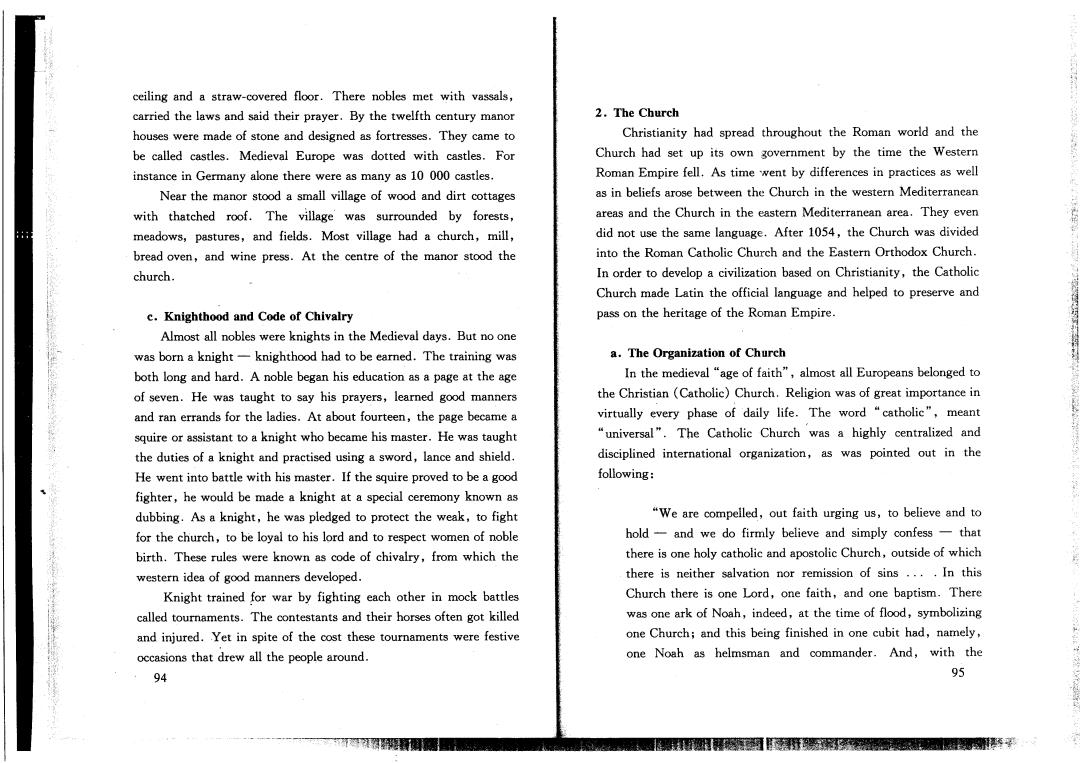
ceiling and a straw-covered floor.There nobles met with vassals, carried the laws and said their prayer.By the twelfth century manor 2.The Church houses were made of stone and designed as fortresses.They came to Christianity had spread throughout the Roman world and the be called castles.Medieval Europe was dotted with castles.For Church had set up its own government by the time the Western instance in Germany alone there were as many as 10 000 castles. Roman Empire fell.As time went by differences in practices as well Near the manor stood a small village of wood and dirt cottages as in beliefs arose between the Church in the western Mediterranean with thatched roof.The village was surrounded by forests, areas and the Church in the eastern Mediterranean area.They even meadows,pastures,and fields.Most village had a church,mill, did not use the same language.After 1054,the Church was divided bread oven,and wine press.At the centre of the manor stood the into the Roman Catholic Church and the Eastern Orthodox Church. church. In order to develop a civilization based on Christianity,the Catholic Church made Latin the official language and helped to preserve and c.Knighthood and Code of Chivalry pass on the heritage of the Roman Empire. Almost all nobles were knights in the Medieval days.But no one was born a knight-knighthood had to be earned.The training was a.The Organization of Church both long and hard.A noble began his education as a page at the age In the medieval "age of faith",almost all Europeans belonged to of seven.He was taught to say his prayers,learned good manners the Christian (Catholic)Church.Religion was of great importance in and ran errands for the ladies.At about fourteen,the page became a virtually every phase of daily life.The word "catholic",meant squire or assistant to a knight who became his master.He was taught "universal".The Catholic Church was a highly centralized and the duties of a knight and practised using a sword,lance and shield. disciplined international organization,as was pointed out in the He went into battle with his master.If the squire proved to be a good following: fighter,he would be made a knight at a special ceremony known as dubbing.As a knight,he was pledged to protect the weak,to fight "We are compelled,out faith urging us,to believe and to for the church,to be loyal to his lord and to respect women of noble hold-and we do firmly believe and simply confess-that birth.These rules were known as code of chivalry,from which the there is one holy catholic and apostolic Church,outside of which western idea of good manners developed. there is neither salvation nor remission of sins....In this Knight trained for war by fighting each other in mock battles Church there is one Lord,one faith,and one baptism.There called tournaments.The contestants and their horses often got killed was one ark of Noah,indeed,at the time of flood,symbolizing and injured.Yet in spite of the cost these tournaments were festive one Church;and this being finished in one cubit had,namely, occasions that drew all the people around. one Noah as helmsman and commander.And,with the 94 95 提 释周野常不子
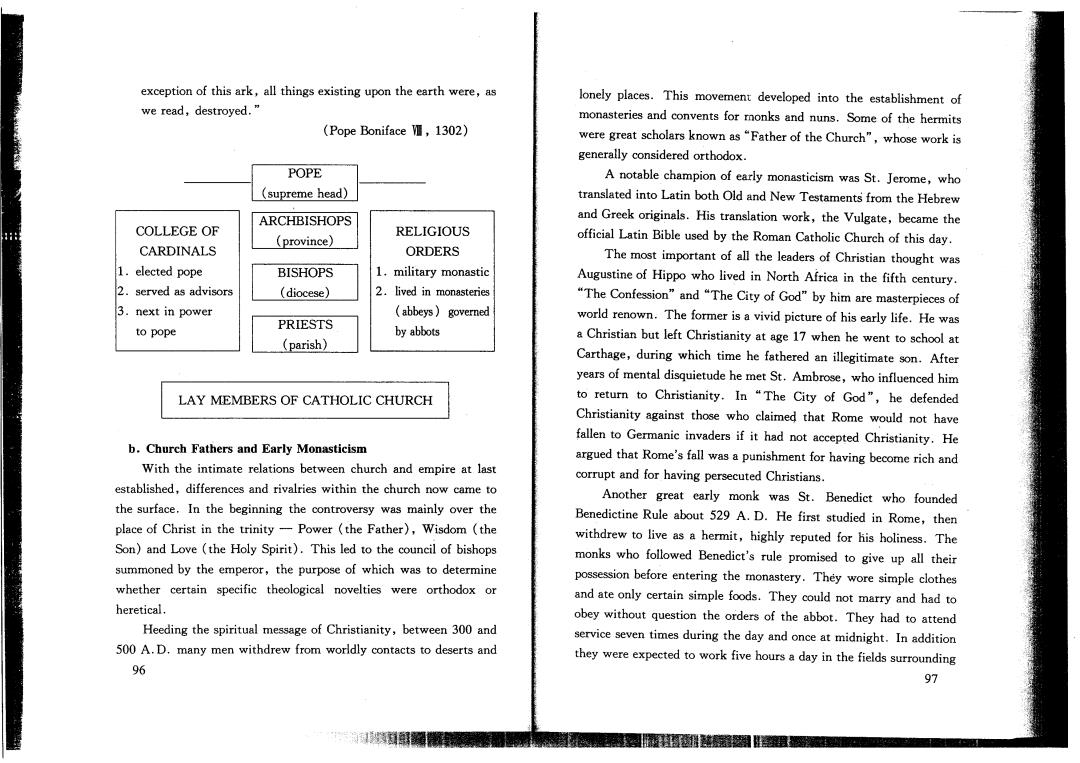
exception of this ark,all things existing upon the earth were,as lonely places.This movement developed into the establishment of we read,destroyed." monasteries and convents for monks and nuns.Some of the hermits (Pope BonifaceⅧ,1302) were great scholars known as "Father of the Church",whose work is generally considered orthodox. POPE A notable champion of early monasticism was St.Jerome,who (supreme head) translated into Latin both Old and New Testaments from the Hebrew ARCHBISHOPS and Greek originals.His translation work,the Vulgate,became the COLLEGE OF RELIGIOUS (province) official Latin Bible used by the Roman Catholic Church of this day. CARDINALS ORDERS The most important of all the leaders of Christian thought was 1. elected pope BISHOPS 1.military monastic Augustine of Hippo who lived in North Africa in the fifth century. 2.served as advisors (diocese) 2.lived in monasteries “The Confession”and“The City of God”by him are masterpieces of 3.next in power (abbeys)governed PRIESTS world renown.The former is a vivid picture of his early life.He was to pope by abbots (parish) a Christian but left Christianity at age 17 when he went to school at Carthage,during which time he fathered an illegitimate son.After years of mental disquietude he met St.Ambrose,who influenced him LAY MEMBERS OF CATHOLIC CHURCH to return to Christianity.In "The City of God",he defended Christianity against those who claimed that Rome would not have fallen to Germanic invaders if it had not accepted Christianity.He b.Church Fathers and Early Monasticism argued that Rome's fall was a punishment for having become rich and With the intimate relations between church and empire at last corrupt and for having persecuted Christians. established,differences and rivalries within the church now came to Another great early monk was St.Benedict who founded the surface.In the beginning the controversy was mainly over the Benedictine Rule about 529 A.D.He first studied in Rome,then place of Christ in the trinity-Power (the Father),Wisdom (the withdrew to live as a hermit,highly reputed for his holiness.The Son)and Love (the Holy Spirit).This led to the council of bishops monks who followed Benedict's rule promised to give up all their summoned by the emperor,the purpose of which was to determine possession before entering the monastery.They wore simple clothes whether certain specific theological novelties were orthodox or and ate only certain simple foods.They could not marry and had to heretical. obey without question the orders of the abbot.They had to attend Heeding the spiritual message of Christianity,between 300 and service seven times during the day and once at midnight.In addition 500 A.D.many men withdrew from worldly contacts to deserts and they were expected to work five hours a day in the fields surrounding 96 97
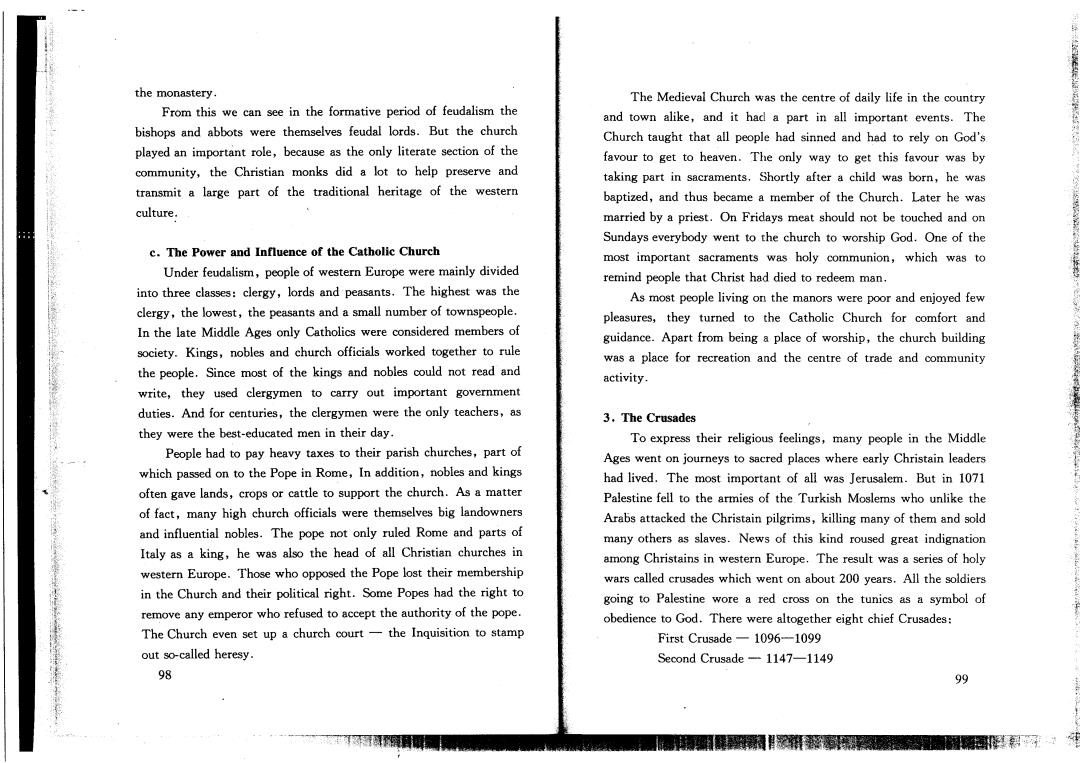
the monastery. The Medieval Church was the centre of daily life in the country From this we can see in the formative period of feudalism the and town alike,and it had a part in all important events.The bishops and abbots were themselves feudal lords.But the church Church taught that all people had sinned and had to rely on God's played an important role,because as the only literate section of the favour to get to heaven.The only way to get this favour was by community,the Christian monks did a lot to help preserve and taking part in sacraments.Shortly after a child was born,he was transmit a large part of the traditional heritage of the western baptized,and thus became a member of the Church.Later he was culture. married by a priest.On Fridays meat should not be touched and on 17: Sundays everybody went to the church to worship God.One of the c.The Power and Influence of the Catholic Church most important sacraments was holy communion,which was to Under feudalism,people of western Europe were mainly divided remind people that Christ had died to redeem man. into three classes:clergy,lords and peasants.The highest was the As most people living on the manors were poor and enjoyed few clergy,the lowest,the peasants and a small number of townspeople. pleasures,they turned to the Catholic Church for comfort and In the late Middle Ages only Catholics were considered members of guidance.Apart from being a place of worship,the church building society.Kings,nobles and church officials worked together to rule was a place for recreation and the centre of trade and community the people.Since most of the kings and nobles could not read and activity. write,they used clergymen to carry out important government duties.And for centuries,the clergymen were the only teachers,as 3.The Crusades they were the best-educated men in their day. To express their religious feelings,many people in the Middle People had to pay heavy taxes to their parish churches,part of Ages went on journeys to sacred places where early Christain leaders which passed on to the Pope in Rome,In addition,nobles and kings had lived.The most important of all was Jerusalem.But in 1071 often gave lands,crops or cattle to support the church.As a matter Palestine fell to the armies of the Turkish Moslems who unlike the of fact,many high church officials were themselves big landowners Arabs attacked the Christain pilgrims,killing many of them and sold and influential nobles.The pope not only ruled Rome and parts of many others as slaves.News of this kind roused great indignation Italy as a king,he was also the head of all Christian churches in among Christains in western Europe.The result was a series of holy western Europe.Those who opposed the Pope lost their membership wars called crusades which went on about 200 years.All the soldiers in the Church and their political right.Some Popes had the right to going to Palestine wore a red cross on the tunics as a symbol of remove any emperor who refused to accept the authority of the pope. obedience to God.There were altogether eight chief Crusades: The Church even set up a church court-the Inquisition to stamp First Crusade-1096-1099 out so-called heresy. Second Crusade-1147-1149 98 99
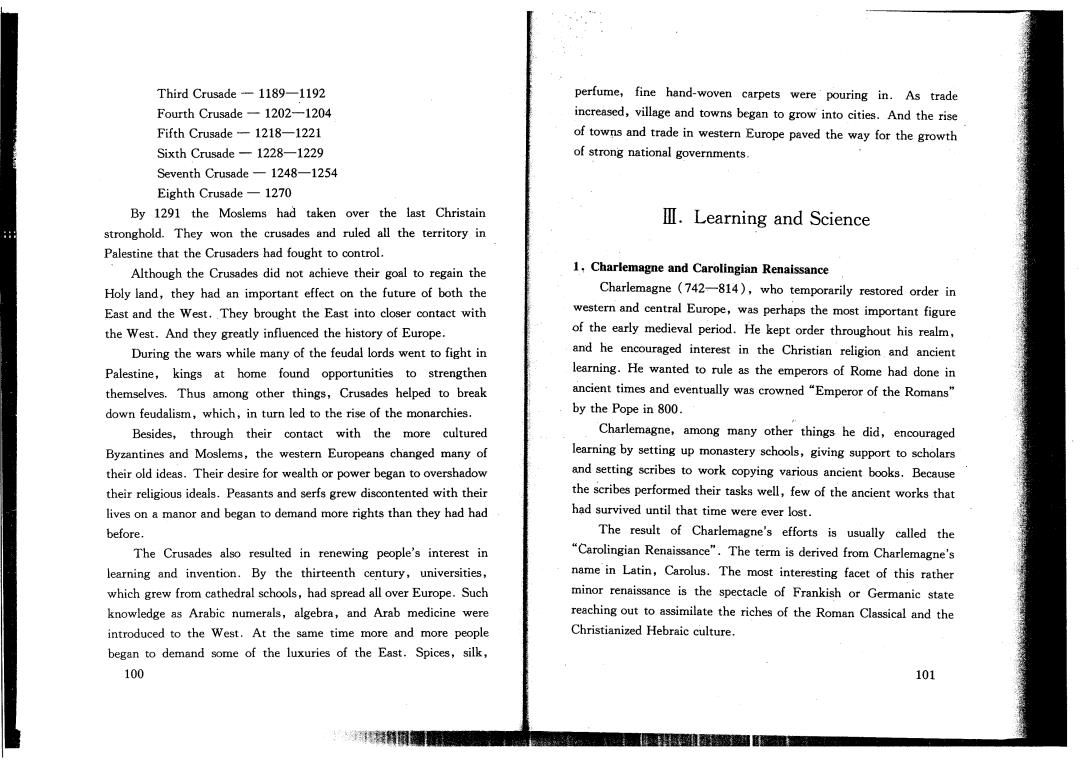
Third Crusade-1189-1192 perfume,fine hand-woven carpets were pouring in.As trade Fourth Crusade-1202-1204 increased,village and towns began to grow into cities.And the rise Fifth Crusade-1218-1221 of towns and trade in western Europe paved the way for the growth Sixth Crusade -1228-1229 of strong national governments. Seventh Crusade-1248-1254 Eighth Crusade一1270 By 1291 the Moslems had taken over the last Christain III.Learning and Science stronghold.They won the crusades and ruled all the territory in Palestine that the Crusaders had fought to control. Although the Crusades did not achieve their goal to regain the 1,Charlemagne and Carolingian Renaissance Holy land,they had an important effect on the future of both the Charlemagne (742-814),who temporarily restored order in East and the West.They brought the East into closer contact with western and central Europe,was perhaps the most important figure the West.And they greatly influenced the history of Europe. of the early medieval period.He kept order throughout his realm, During the wars while many of the feudal lords went to fight in and he encouraged interest in the Christian religion and ancient Palestine,kings at home found opportunities to strengthen learning.He wanted to rule as the emperors of Rome had done in themselves.Thus among other things,Crusades helped to break ancient times and eventually was crowned "Emperor of the Romans" down feudalism,which,in turn led to the rise of the monarchies. by the Pope in 800. Besides,through their contact with the more cultured Charlemagne,among many other things he did,encouraged Byzantines and Moslems,the western Europeans changed many of learning by setting up monastery schools,giving support to scholars their old ideas.Their desire for wealth or power began to overshadow and setting scribes to work copying various ancient books.Because their religious ideals.Peasants and serfs grew discontented with their the scribes performed their tasks well,few of the ancient works that lives on a manor and began to demand more rights than they had had had survived until that time were ever lost. before. The result of Charlemagne's efforts is usually called the The Crusades also resulted in renewing people's interest in "Carolingian Renaissance".The term is derived from Charlemagne's learning and invention.By the thirteenth century,universities, name in Latin,Carolus.The most interesting facet of this rather which grew from cathedral schools,had spread all over Europe.Such minor renaissance is the spectacle of Frankish or Germanic state knowledge as Arabic numerals,algebra,and Arab medicine were reaching out to assimilate the riches of the Roman Classical and the introduced to the West.At the same time more and more people Christianized Hebraic culture. began to demand some of the luxuries of the East.Spices,silk, 100 101 鞋臂钢
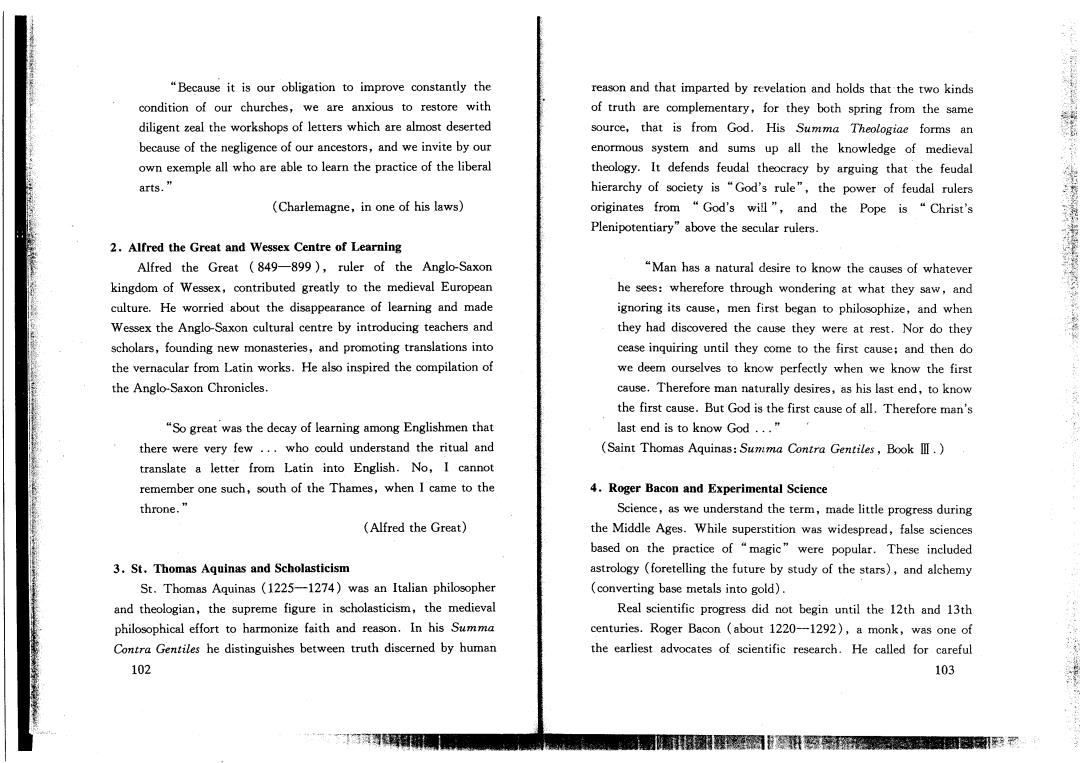
"Because it is our obligation to improve constantly the reason and that imparted by revelation and holds that the two kinds condition of our churches,we are anxious to restore with of truth are complementary,for they both spring from the same diligent zeal the workshops of letters which are almost deserted source,that is from God.His Summa Theologiae forms an because of the negligence of our ancestors,and we invite by our enormous system and sums up all the knowledge of medieval own exemple all who are able to learn the practice of the liberal theology.It defends feudal theocracy by arguing that the feudal arts.” hierarchy of society is "God's rule",the power of feudal rulers (Charlemagne,in one of his laws) originates from "God's will",and the Pope is "Christ's Plenipotentiary"above the secular rulers. 2.Alfred the Great and Wessex Centre of Learning Alfred the Great (849-899),ruler of the Anglo-Saxon "Man has a natural desire to know the causes of whatever kingdom of Wessex,contributed greatly to the medieval European he sees:wherefore through wondering at what they saw,and culture.He worried about the disappearance of learning and made ignoring its cause,men first began to philosophize,and when Wessex the Anglo-Saxon cultural centre by introducing teachers and they had discovered the cause they were at rest.Nor do they scholars,founding new monasteries,and promoting translations into cease inquiring until they come to the first cause;and then do the vernacular from Latin works.He also inspired the compilation of we deem ourselves to know perfectly when we know the first the Anglo-Saxon Chronicles. cause.Therefore man naturally desires,as his last end,to know the first cause.But God is the first cause of all.Therefore man's "So great was the decay of learning among Englishmen that last end is to know God..." there were very few...who could understand the ritual and (Saint Thomas Aquinas:Summa Contra Gentiles,Book I.) translate a letter from Latin into English.No,I cannot remember one such,south of the Thames,when I came to the 4.Roger Bacon and Experimental Science throne.” Science,as we understand the term,made little progress during (Alfred the Great) the Middle Ages.While superstition was widespread,false sciences based on the practice of "magic"were popular.These included 3.St.Thomas Aquinas and Scholasticism astrology (foretelling the future by study of the stars),and alchemy St.Thomas Aquinas (1225-1274)was an Italian philosopher (converting base metals into gold). and theologian,the supreme figure in scholasticism,the medieval Real scientific progress did not begin until the 12th and 13th philosophical effort to harmonize faith and reason.In his Summa centuries.Roger Bacon (about 1220-1292),a monk,was one of Contra Gentiles he distinguishes between truth discerned by human the earliest advocates of scientific research.He called for careful 102 103
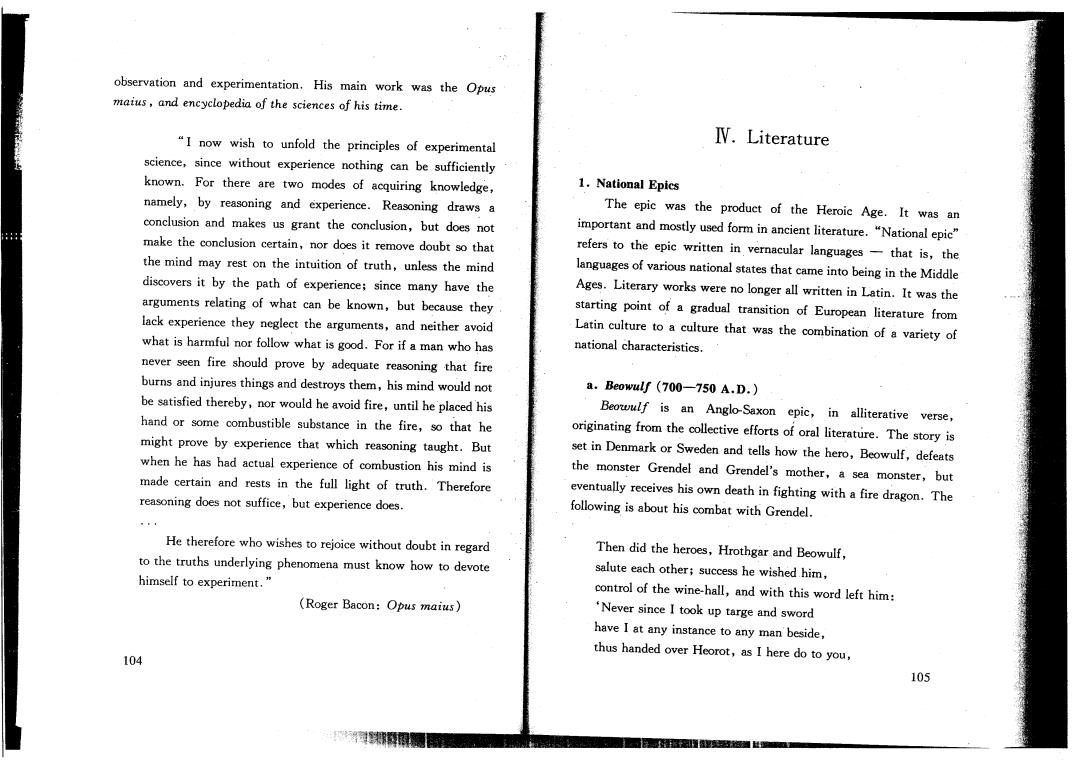
observation and experimentation.His main work was the Opus maius,and encyclopedia of the sciences of his time. "I now wish to unfold the principles of experimental IV.Literature science,since without experience nothing can be sufficiently known.For there are two modes of acquiring knowledge, 1.National Epics namely,by reasoning and experience.Reasoning draws a The epic was the product of the Heroic Age.It was an conclusion and makes us grant the conclusion,but does not important and mostly used form in ancient literature."National epic" make the conclusion certain,nor does it remove doubt so that refers to the epic written in vernacular languages-that is,the the mind may rest on the intuition of truth,unless the mind languages of various national states that came into being in the Middle discovers it by the path of experience;since many have the Ages.Literary works were no longer all written in Latin.It was the arguments relating of what can be known,but because they starting point of a gradual transition of European literature from lack experience they neglect the arguments,and neither avoid Latin culture to a culture that was the combination of a variety of what is harmful nor follow what is good.For if a man who has national characteristics. never seen fire should prove by adequate reasoning that fire burns and injures things and destroys them,his mind would not a.Beowulf (700-750 A.D.) be satisfied thereby,nor would he avoid fire,until he placed his hand or some combustible substance in the fire,so that he Beowulf is an Anglo-Saxon epic,in alliterative verse, might prove by experience that which reasoning taught.But originating from the collective efforts of oral literature.The story is when he has had actual experience of combustion his mind is set in Denmark or Sweden and tells how the hero,Beowulf,defeats made certain and rests in the full light of truth.Therefore the monster Grendel and Grendel's mother,a sea monster,but reasoning does not suffice,but experience does. eventually receives his own death in fighting with a fire dragon.The following is about his combat with Grendel. He therefore who wishes to rejoice without doubt in regard Then did the heroes,Hrothgar and Beowulf, to the truths underlying phenomena must know how to devote himself to experiment. salute each other;success he wished him, control of the wine-hall,and with this word left him: (Roger Bacon:Opus maius) 'Never since I took up targe and sword have I at any instance to any man beside, 104 thus handed over Heorot,as I here do to you, 105

Have and hold now the house of the Danes! he was no longer to feast on the flesh of mankind Bend your mind and your body to this task after that night. and wake against the foe!There'll be no want of liberality Narrowly the powerful if you come out alive from this ordeal of courage.' kinsman of Hygelac kept watch how the ravager Then Hrothgar departed,the Protector of the Danes set to work with his sudden catches; passed from the hall at the head of his troop. nor did the monster mean to hang back. The war-leader sought Wealhtheow his queen, As a first step he set his hands on the companion of his bed. a sleeping soldier,savagely tore at him, Thus did the King of Glory, gnashed at his bone-joints,bolted huge gobbets, to oppose this Grendel,appoint a hall-guard sucked at his veins,and had soon eaten -so the tale went abroad-who took on a special all of the dead man,even down to his task at the court-to cope with the monster. hands and feet. The Geat prince placed all his trust Forward he stepped, in his mighty strength,his Maker's favour. stretched out his hands to seize the warrior Walking to the hall came this warlike creature calmly at rest there,reached out for him with his condemned to agony.The door gave way, unfriendly fingers:but the faster man toughened with iron,at the touch of those hands. forestalling,sat up,sent back his arm. Rage-inflamed,wreckage-ben,he ripped open The upholder of evils at once knew the jaws of the hall.Hastening on, he had not met,on middle earth's the foe then stepped onto the unstained floor. extremest acres,with any man angrily advanced:out of his eyes stood of harder hand-grip:his heart panicked. an unlovely light like that of fire. He was quit of the place no more quickly for that. He saw then in the hall a host of young soldiers, a company of kinsmen caught away in sleep, Eager to be away,he ailed for his darkness a whole warrior-band.In his heart he laughed then, and the company of devils;the dealings he had there horrible monster,his hopes swelling were like nothing he had come across in his lifetime. to a gluttonous meal.He meant to wrench Then Hygelac's brave kinsman called to mind the life from each body that lay in the place that evening's utterance,upright he stood, before night was done.It was not to be; fastened his hold till fingers were bursting. 106 107
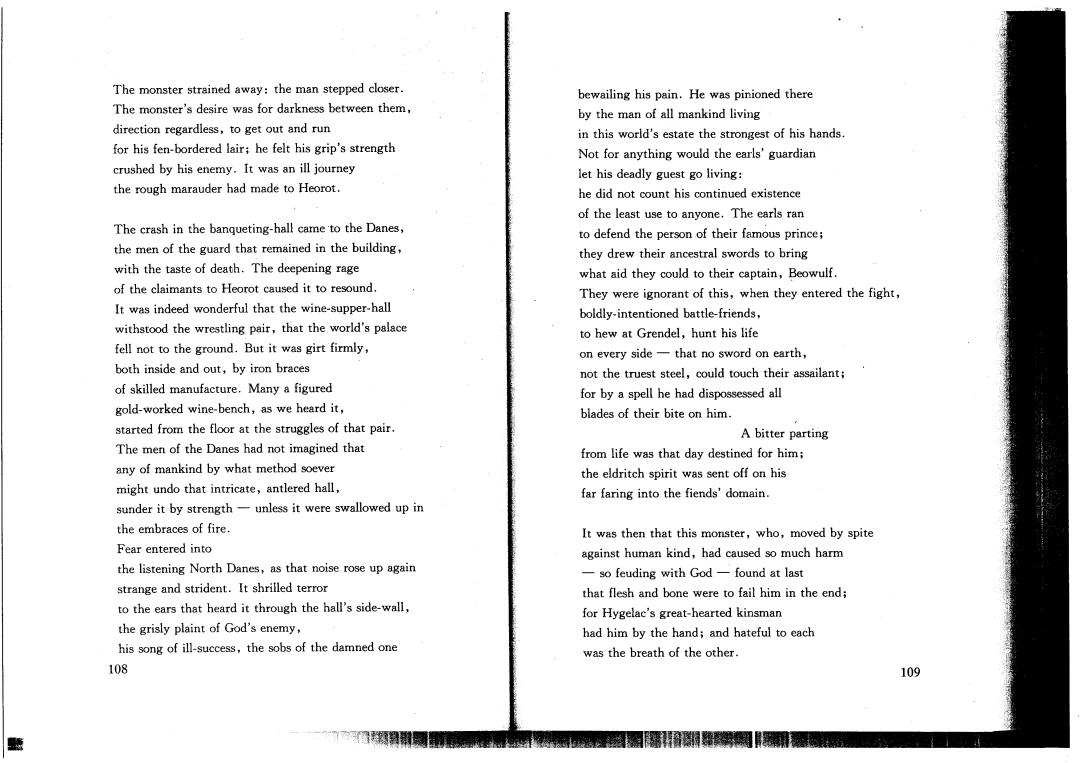
The monster strained away:the man stepped closer. bewailing his pain.He was pinioned there The monster's desire was for darkness between them, by the man of all mankind living direction regardless,to get out and run in this world's estate the strongest of his hands. for his fen-bordered lair;he felt his grip's strength Not for anything would the earls'guardian crushed by his enemy.It was an ill journey let his deadly guest go living: the rough marauder had made to Heorot. he did not count his continued existence of the least use to anyone.The earls ran The crash in the banqueting-hall came to the Danes, to defend the person of their famous prince; the men of the guard that remained in the building, they drew their ancestral swords to bring with the taste of death.The deepening rage what aid they could to their captain,Beowulf. of the claimants to Heorot caused it to resound. They were ignorant of this,when they entered the fight, It was indeed wonderful that the wine-supper-hall boldly-intentioned battle-friends, withstood the wrestling pair,that the world's palace to hew at Grendel,hunt his life fell not to the ground.But it was girt firmly, on every side-that no sword on earth, both inside and out,by iron braces not the truest steel,could touch their assailant; of skilled manufacture.Many a figured for by a spell he had dispossessed all gold-worked wine-bench,as we heard it, blades of their bite on him. started from the floor at the struggles of that pair. A bitter parting The men of the Danes had not imagined that from life was that day destined for him; any of mankind by what method soever the eldritch spirit was sent off on his might undo that intricate,antlered hall, far faring into the fiends'domain. sunder it by strength-unless it were swallowed up in the embraces of fire. It was then that this monster,who,moved by spite Fear entered into against human kind,had caused so much harm the listening North Danes,as that noise rose up again -so feuding with God-found at last strange and strident.It shrilled terror that flesh and bone were to fail him in the end; to the ears that heard it through the hall's side-wall, for Hygelac's great-hearted kinsman the grisly plaint of God's enemy, had him by the hand;and hateful to each his song of ill-success,the sobs of the damned one was the breath of the other. 108 109 题